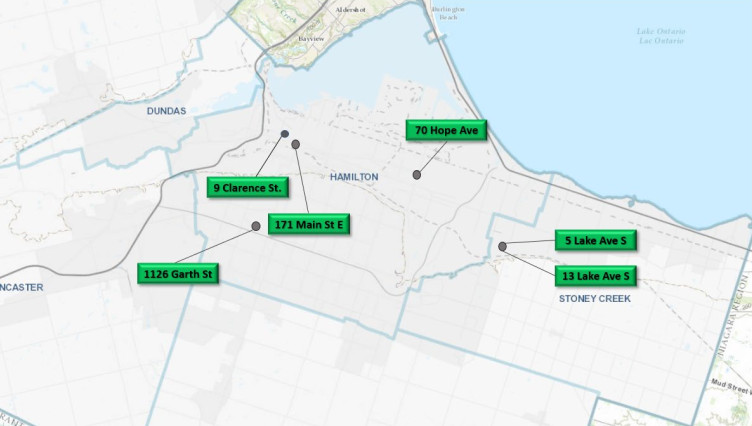The director of a charity creating affordable housing across Hamilton says a plan to develop a mix of five city-owned parking lots and vacant properties into some 150 permanent dwellings has potential.

Indwell’s Graham Cubitt says city staff had previously talked to members of the Hamilton is Home Coalition about the surplus locations prior to a committee vote Wednesday that suggested reaching out to partners on the prospect of builds to ease the current housing crunch.
“It’s a long time coming, sort of a conversation that’s evolved over time,” Cubitt said.
“Fantastic to have city staff and council looking to use land that we don’t need for city purposes anymore for the housing crisis.”
The idea goes as far back as 2016 when a city report sought approval to declare certain municipal parking lots as surplus, including a lot at 171 Main St. E.
Two years later council approved a report to declare some city-owned properties surplus and proposed disposition strategies to support affordable housing.
Last week’s approval, which still needs council ratification, calls on staff to do a deeper dive into other possible site conversions in addition to the current five properties earmarked for development.
“A lot of these are parking lots that maybe parking some cars, but they really are functioning at a very sort of like utilitarian level,” Cubitt revealed.
“They’re in great neighbourhoods, walkable communities and places where people want to live.”
Funding for costs tied to rezoning and disposition of the properties would come through the federal government-backed CMHC Housing Accelerator Fund with a strategy for “nominal value” sales to non-profit affordable housing partners.
- U.K. bans generic passwords over cybersecurity concerns. Should Canada be next?
- Princess Anne to help commission new navy vessel in B.C. ceremony
- Some 2019 candidates ‘appeared willing’ to engage with foreign interference: Hogue inquiry
- Foreign interference ‘undermined’ public confidence in elections: inquiry
The idea would also involve the sale of the Main Street East lot on the open market to free up cash for building purposes.
Cubitt suggests “not throwing that opportunity away,” though, saying the plot has the potential to host 200 or 300 units of housing with rents around $1,000 a month.
Cubitt says the financial “mechanisms” for construction are still not completely clear in the latest report and need to be “worked out” before any completion dates on the build can be predicted.
“So because we haven’t worked out which organization would be interested in a specific site or an actual business plan for that project yet, I would say it’s a few months before that gets going,” he said.
“But … ideally all of these sites, if we all co-operated in the same direction, could have something happening by the end of the year.”





Comments